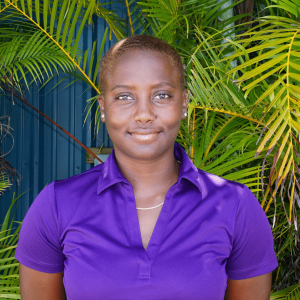From as young as I can recall, my happy place was always the water. Whether pool beach or open ocean, I reveled at how the human body became seemingly weightless and fluid underneath the water’s surface. Early on my love for the water naturally culminated into my hobbies. Competitive swimming as a member of Dolphins Swim Club was the first notch on my belt of water skills. Apart from fishing trips with my dad and spending every birthday at Blue Lagoon Island with the dolphins, my first exposure to local Bahamian marine life was during BREEF’s sea camp in the summer of 2009. By the end of those two weeks, I had seen lionfish for the first time snorkeling off the rocky shore of Saunders Beach, barracuda in the shallows of Goodman’s Bay, and could name every animal in the Ardastra Gardens Zoo- the camp’s base. Oh, and I decided I wanted to be a marine biologist.
Fast forward to my senior year in high school, I was once again clueless to what my career should be. I considered what I was good at- talking, my character- a fun-loving social butterfly, and what I enjoyed- a little bit of everything. That not making it any easier, my study options were still scattered: Marine biology? Public relations? Law? In the final hour, my gut told me to go with what I was passionate about: a love for the water and a soft spot for animals, and with a quick google search combining the two together, I once again arrived at being an aspiring marine biologist. It was a simple conclusion that made sense to me, although when people questioned what exactly a marine biologist does, my vague “swim with the fish” response didn’t seem to rock the room.
Instead of beginning college after graduation summer like the rest of my peers, I spent the fall semester earning my dive certifications; collecting essential pieces of a not so certain puzzle. Lack of a clear career course quickly created uncertainties, and paired with societal pressure and the fear of never finding a job in the marine field, I decided to go broad with my college studies. “You can’t go wrong with biology” I thought. It was the most comprehensive science covering any potential career in STEM. Two years later, now with an Associate’s degree, my credentials still weren’t enough to pry the door of opportunity open. As I returned home and entered the job market, being a skilled competitive swimmer gave me a slight edge for field-adjacent positions like lifeguarding, however I struggled for years to find a job in the marine field due to lack of experience and guidance. For starters, I had no idea where to look! In a country like The Bahamas dominated by tourism, major hotels are usually the first place to apply, but unfortunately I rarely advanced beyond the first interview for positions in marine departments.
After two years of jobs in everything but the marine field, it was time to make some adjustments. Although still unsure of an absolute career path, I knew my passion for the ocean and animals would lead the way. For me, deciding to attend the University of the West Indies (UWI) Mona campus in Jamaica was the game changer. Reflecting on my senior year in high school, I had never even thought to consider UWI as an option for college. Known as “the school where all the doctors go”, I was pleasantly surprised to discover UWI’s three year Bachelors of Science (BSc.) program included marine biology as an available major, as well as the built in sponsorship from the Bahamian government that made tuition much more affordable than universities in the United States and Canada. Two and a half years of mostly online learning in a pandemic later, I earned my BSc. in Marine Biology. Combined with four diver certifications and years of experience in water safety, my qualifications could now crack open the door of opportunities in the marine field, the first being an internship at the Perry Institute of Marine Science (PIMS).

Having completed an internship application late 2021, I was beyond ecstatic to receive an offer to join the PIMS team as a 2022 summer intern (and when I say ecstatic, I mean “this letter serves as my formal resignation”, leave my job ecstatic). Focusing on Science Communications and Digital Media, my main assignment was to capture the Rising Tides four week long summer session from start to finish. Doubling as a student of our experienced Communications Director Lily Haines and a mentor to the Rising Tides students alongside Dr. Karlisa Callwood, the Director of PIMS’ Community Conservation Education & Action (CCEA) program, allowed learning and teaching simultaneously; a truly well-rounded experience.
Like BREEF’s summer sea camp was for me, CCEA’s Rising Tides program is a doorway into the depths of the marine world and its many niches. Rising Tides provides young Bahamians with early exposure to the marine field, insight into many different field-related careers, and teaches valuable skills and techniques that can all be used to design personal, academic, and career pathways. Launched in March 2022, the Rising Tides pilot program was structured to expose students to marine conservation-related content through classroom lessons and hands-on field studies throughout the school year and summer months. Eight applicants were selected, and once a month embarked on excursions beginning in the wetlands of the mangroves at Bonefish Pond National Park and the South Beach flats, progressing deeper into the shallow seagrasses of familiar areas like Goodman’s Bay and Jaws Beach. Employing useful field techniques like the use of quadrats and transect lines to collect valuable data, for example seagrass percent cover, allowed for the students to connect common field work practices to theory and tasks such as data collection and data analysis.
The Rising Tides summer session was all about diving deeper into the marine world, literally and figuratively. Focusing on the various factors of the coral reef ecosystem, Dr. Callwood covered fundamental topics like fish and coral species identification (ID), while the coral team’s research technician Meghyn Fountain presented on concerning environmental issues like Stony Coral Tissue Loss Disease (SCTLD) and other coral diseases; current plagues that are actively destroying the livelihood of our Bahamian coral reefs. Others like Mr. Lindy Knowles, National Park Manager and veteran conservation ecologist of the Bahamas National Trust shared with us valuable insights on working in conservation, including the different factors that contribute to the success of marine protected areas. With funding provided by the US Embassy-Nassau, the Curtis & Edith Munson Foundation, and the Disney Conservation Fund, students and interns were given the opportunity to complete an array of dive certifications starting at Open Water Diver and progressing to specialty courses like Reef Rescue Diver. Created by PIMS’ very own Reef Rescue Network (RRN), the Reef Rescue Diver certification is an amazing gateway to coral reef conservation practices. Essentially operating as an underwater coral farm, coral nurseries are structures that suspend the clippings of regionally important species like elkhorn and staghorn coral off the ocean floor away from predators and competitors. By creating more optimal conditions, coral nurseries increase the growth of corals tremendously. In gaining the reef rescue certification we learned the proper techniques needed to maintain a coral nursery. Our newfound skills now qualify us to be volunteers of the RRN and join in on future restoration efforts, like outplanting healthy tree-grown corals onto coral reefs.


Knowledge and experience paired with being relatively young myself made my job as a student mentor a lot easier. It was effortless for me to connect with our teenage students by giving useful tips and playing paparazzi while swimming alongside them. I even learned a thing or two when it came to coral ID – who else would think to nickname Great Star coral ‘juicy grapes’? Prior to participating in the program, the Rising Tides students all had unique relationships with the water. Payton is an active member of the WaveRunners Swim Club, and didn’t hesitate to show off his speed in some head to head races. Likewise, long time schoolmates Shacobe and Micah used every activity as a competition, and it’s safe to say Micah leads the way in fish ID. Kirstinique, an island girl hailing from Andros, was a natural talent under the water and mastered the skills of open water diving almost instantly. As the 2022 Rising Tides pilot program comes to an end, both students and interns like myself leave with beneficial takeaways. Now having more dive certifications, experience in handling underwater cameras and peer mentorship, I say with confidence I intend to pursue a career in marine conservation with underwater photography as a handy secondary skillset. This experience helped me structure a five year goal list: be featured on the National Geographic or Discovery channel, find a job that allows me to explore the oceans of the world, and contribute to efforts like endangered species restoration and animal rescue and rehabilitation. Using my voice as a science communicator is also very important to me and eventually, I believe my path will lead to working in education. It is a personal long term goal of mine to serve as a guide for young adults, helping them better navigate the confusing stages of high school and college and be more decisive in developing their chosen paths. Two of our recently graduated students Micah and Meniya intend to pursue marine biology degrees in Alabama, while Shacobe will attend the University of the Bahamas to study Biochemistry. When asked, Shacobe said the Rising Tides program helped him understand he didn’t have to choose between his two passions, marine science and medicine. Now, he intends to further develop his skills and knowledge to work in marine medicine creating treatments and cures for fish and coral diseases like SCTLD. Other students like Angelina are eager to continue engaging in local conservation efforts and actions as they continue their education. As the daughter of a boat captain, Angelina feels inspired to get her boat captain’s license and pursue a career in marine field research.

The Rising Tides program was without a doubt successful in highlighting several aspects of marine conservation and research. With the continuation of this program, the Perry Institute has the power to forge new generations of Bahamian marine conservationists and inspire young adults and teenagers to be a voice for their environments and get involved in sustainable practices that promote the growth and success of The Bahamas environmentally and economically. Through the option of a student or internship program, opportunities to work with Perry Institute are open to both senior high school and college students and graduates interested in gaining more exposure to marine conservation research and field work. And unlike myself all those years ago, our Rising Tides students are better equipped with firsthand knowledge to answer questions like “what do you want to be?” with more detailed responses like marine social scientist, marine ecologist, coral or fisheries expert, data analyst, underwater photographer, marine conservationist, and many other career titles. If programs like Rising Tides were more common 10 years ago, I may have just found my niche a bit sooner. Luckily for the younger generations, this worthwhile experience is just one application away.
.jpg)
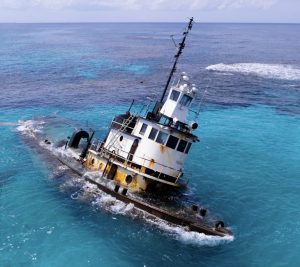
A Year Later, Stranded Tug and Barge Still Scars Reef in Fowl Cays National Park–Residents Demand Accountability
A haunting aerial view of the grounded tug and barge in Fowl Cays National Park—still embedded in coral a year later, a stark reminder of the cost of inaction. Photo
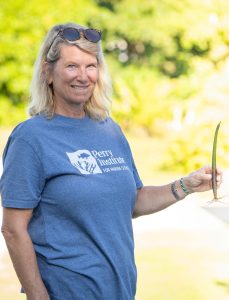
Women Leading Mangrove Restoration in The Bahamas
Have you ever wondered who’s behind the scenes saving our environment, right in our own backyard? Picture a group of energetic, determined women rolling up their sleeves and diving into
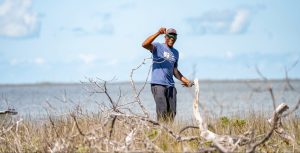
Rewilding the Marls of Abaco: PIMS Plants 100,000 Mangroves and Counting in 2024
As the afternoon sun bathes the Marls of Abaco in golden light, Bahamian boat captain Willis Levarity–locally known as “Captain to the Stars”–stands ankle-deep in soft, warm mud. A broad
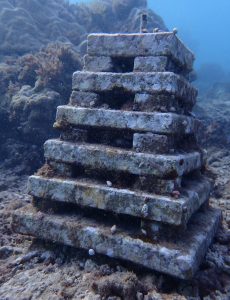
Unveiling Coral Reef Biodiversity: Insights from ARMS Monitoring Structures
An ARM teeming with new coral recruits and a diversity of marine life, highlighting reef recovery and biodiversity Understanding Coral Reef Biodiversity Most new PhDs in the natural sciences move
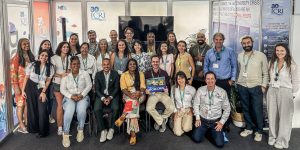
7 Key Takeaways from COP16: Confronting Coral Reef Challenges in a Changing Climate
United #ForCoral: Experts, advocates, and leaders from across the globe join forces at COP16 for the #ForCoral conference, hosted by the International Coral Reef Initiative. Together, they’re driving urgent action
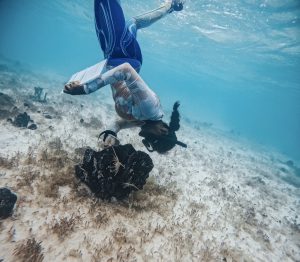
Fieldwork Wrap-Up: Strengthening MPA Management in The Bahamas
Marine protected areas (MPAs) are critical tools in the conservation of marine species and habitats, safeguarding reefs, seagrasses, and mangroves that provide vital ecosystem services to coastal communities. At the


